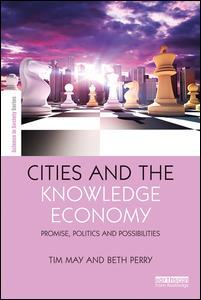Cities and the Knowledge Economy Promise, Politics and Possibilities The Earthscan Science in Society Series
Auteurs : May Tim, Perry Beth

Cities and the Knowledge Economy is an in-depth, interdisciplinary, international and comparative examination of the relationship between knowledge and urban development in the contemporary era. Through the lenses of promise, politics and possibility, it examines how the knowledge economy has arisen, how different cities have sought to realise its potential, how universities play a role in its realisation and, overall, what this reveals about the relationship between politics, capitalism, space, place and knowledge in cities.
The book argues that the 21st century city has been predicated on particular circuits of knowledge that constitute expertise as residing in elite and professional epistemic communities. In contrast, alternative conceptions of the knowledge society are founded on assumptions which take analysis, deliberation, democracy and the role of the citizen and communities of practice seriously. Drawing on a range of examples from cities around the world, the book reflects on these possibilities and asks what roles the practice of ?active intermediation?, the university and a critical and engaged social scientific practice can all play in this process.
The book is aimed at researchers and students from different disciplines ? geography, politics, sociology, business studies, economics and planning ? with interests in contemporary urbanism and the role of knowledge in understanding development, as well as urban policymakers, politicians and practitioners who are concerned with the future of our cities and seek to create coalitions of different communities oriented towards more just and sustainable futures.
Introduction
1. The Knowledge Economy
2. Cities as Sites of Intervention
3. Game of Scales
4. Universities as Engines of Growth
5. Knowing the City
6. Excavating Alternatives in the Shadows of the Knowledge Economy
7. Critique and transformation in the ‘real’ university
8. Organising for Participative Futures
Tim May is Professor of Social Science Methodology in the Sheffield Methods Institute, University of Sheffield. He originally trained and worked as an agricultural engineer and following an evening return-to-study course, studied at the LSE, Surrey and Plymouth universities. In addition to his teaching across a range of subjects, Tim has authored and edited sixteen books, including new editions, which have been translated into fifteen languages, as well as over one hundred and eighty articles, book chapters, research reports and policy briefings. His work has been funded by national and international research councils and the topics of his research and writings cover: urban knowledge exchange; policy development and learning; universities, cities and socio-economic development; management and organizational change; research methods and methodology; social and political theory and philosophy of social science.
Beth and Tim are currently co-authoring Reflexivity: The Essential Guide (2017) and a fifth edition of Social Research: Issues, Methods and Process (2018) and working on a research programme entitled ‘Realising Just Cities’. Tim is also writing a third edition of Thinking Sociologically (co-authored with the late Zygmunt Bauman, 2018).
Beth Perry is Professorial Fellow in the Urban Institute, University of Sheffield. She has followed an interdisciplinary path, undertaking degrees in European Studies and Modern Languages, before completing a PhD in Sociology and Political Science. Since 2000 she has worked in and subsequently led urban research centres, with a focus on the processes and practices of urban transformation.
Beth is currently the UK Programme Lead for the Mistra Urban Futures centre, which has established local interaction platforms in South Africa, Kenya, Sweden and the UK to explore the limits and strengths of coproduction in realising just cities. She holds major grant
Date de parution : 11-2017
15.6x23.4 cm
Date de parution : 11-2017
15.6x23.4 cm
Thèmes de Cities and the Knowledge Economy :
Mots-clés :
Urban Living Labs; Urban Poor Fund International; Biodiversity; Hsinchu Science Park; politics; Linear Perspective Vision; university; Transnational Higher Education; capitalism; Social Scientific Knowledge Production; elite; World Social Science Report; communities; Knowledge Based Development; planning; European Spallation Sources; citizen; Epistemic Injustice; democracy; Urban Growth Coalitions; Sustainability; Knowledge Spillovers; Sustainable development; Alternative Institutional Designs; Beth Perry; Higher Journal Rankings; Knowledge Cities; Sustainable Urban Futures; Silicon Alleys; Urban Poor; Civil Society; North American Free Trade Agreement; Urban Research Practices; EU’s Competitiveness; PB Model; Part Iii; UK Bank



